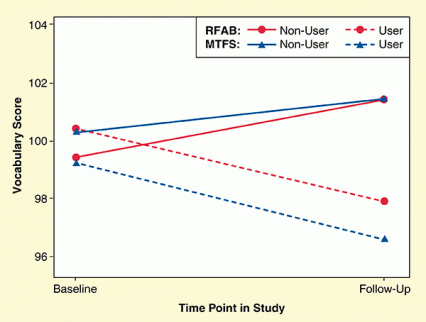
In a recent study sponsored by NIDA and the National Institute of Mental Health, teens who used marijuana lost IQ points relative to their nonusing peers. However, the drug appeared not to be the culprit. The new findings contribute to an ongoing scientific exploration of the drug’s impact on users’ cognition.
Mr. Nicholas Jackson from the University of Southern California, Dr. Joshua Isen from the University of Minnesota, and colleagues tested three hypotheses that should all be confirmed if marijuana causes cognitive impairment that persists beyond the period of acute intoxication. Their results did not support any of the hypotheses. Instead, their evidence suggests that some children’s genes and family environments set them on pathways that lead both to the use of marijuana and to IQ decline.
A Pattern of Deficits
Mr. Jackson, Dr. Isen, and colleagues analyzed data from two long-term studies of twins: the NIMH-funded Risk Factors for Antisocial Behavior (RFAB) study from Southern California (789 children) and the NIDA-funded Minnesota Twin Family Study (MTFS; 2,277 children). In each study, children took a baseline IQ test involving Wechsler intelligence scales at ages 9 to 12 years, before any began using marijuana, and a follow-up test at ages 17 to 20. In the interim, RFAB participants completed biannual questionnaires about marijuana use, and MTFS participants completed self-reports at 3-year intervals.
Altogether, about 42 percent of the children used marijuana at least once in the decade between the two IQ assessments. These teens lost IQ points compared with their nonusing peers on the Vocabulary section of the Wechsler intelligence scales (3.4 to 4.0 points, on average) (see Figure). The marijuana users in the MTFS also fell behind on the Information section (2 points, on average) (RFAB participants did not take this subtest). On the four other subtests examined—Block Design, Matrix Reasoning, Picture Arrangement, and Similarities—The marijuana users kept pace.
The two subtests on which the teens who used marijuana lost ground measure knowledge acquired through experience and learning. The remaining sections, on which the marijuana users scored on a par with their nonusing peers, measure the ability to reason abstractly and solve problems. These results indicate that the marijuana users accumulated less information than the nonusers during the decade between assessments, but run counter to the conclusion that the drug damaged brain cells that underlie cognitive processing.
 Figure. Teens Using Marijuana Show Declines in Verbal IQ Marijuana use between the ages of 9 and 12 and 17 and 20 was associated with declines of 3.4 points in verbal IQ in the MTFS and 4 points in the RFAB. Researchers propose that adverse familial factors give rise to attitudes and behaviors that both promote marijuana use and hamper the accumulation of knowledge.
Figure. Teens Using Marijuana Show Declines in Verbal IQ Marijuana use between the ages of 9 and 12 and 17 and 20 was associated with declines of 3.4 points in verbal IQ in the MTFS and 4 points in the RFAB. Researchers propose that adverse familial factors give rise to attitudes and behaviors that both promote marijuana use and hamper the accumulation of knowledge.
- Text Description of Graphic
-
The figure shows a line graph of verbal IQ scores of users of marijuana and of nonusers at baseline before any marijuana use and at follow-up. Data are shown for two study groups: from the Minnesota Twins Family Study (MTFS) and the Risk Factors for Antisocial Behavior (RFAB) study. The vertical (y-) axis shows the verbal IQ score range examined, from 96 to 104 points, and the horizontal (x-) axis the two time points when IQ was assessed, that is, at the baseline and follow-up. For the RFAB participants, the verbal IQ of nonusers rose by about 2 points, from about 99.5 points at baseline to just above 101 points at the follow-up, and of marijuana users dropped by more than 2 points, from about 100.5 points at baseline to about 98 points at the follow-up. For the MTFS participants, the verbal IQ of nonusers rose by about 1 point, from just over 100 points at baseline to just above 101 points at the follow-up, and of marijuana users dropped by about 2 points, from 99 points at baseline to 97 points at the follow-up.
The Three Hypotheses
The researchers posited that if marijuana use causes users’ IQ to decline, then:
- Marijuana use should precede any declines.
- Heavier users of the drug should incur greater declines.
- Where one twin in a pair uses marijuana and the other doesn’t, the one who uses should subsequently develop a lower IQ relative to the other.
When the researchers examined the first hypothesis, they found that children who would start using marijuana during their teens had IQ scores on par with future abstainers when assessed at the start of the RFAB study (age 9 to 10). Contrary to the hypothesis, however, future users of marijuana in the MTFS already showed an IQ disadvantage at age 11 to 12.
The data from the twin studies didn’t bear out the second hypothesis, either. The researchers compared IQs of study participants who reported having used marijuana at least 30 times or daily for at least 6 months, to those of participants who had also used the drug, but fewer than 30 times. Both groups had IQ declines of the same magnitude.
Nor did the evidence support the third hypothesis. Twins who were discordant for marijuana use (i.e., one used and the other didn’t) had parallel IQ trajectories. This finding suggests that the twins’ IQ was affected by factors that twins share in their genes or family background, rather than factors in which they differed (e.g., drug use). A further analysis, comparing the impact of marijuana use on fraternal versus identical twins, suggested that family-wide environmental influences are more decisive than genes for determining IQ trajectory.
A Marker for Delinquency
Dr. Isen’s and Mr. Jackson’s team found that marijuana users experienced IQ declines in the teen years, but that the drug appeared not to cause them. What, then, did cause them?
The researchers propose that marijuana users fall behind in IQ because they have experienced adverse familial influences that decrease their motivation to learn and predispose them to engage in delinquency and deviant behaviors, including substance use. These negative attitudes and behaviors impede the normal accumulation of vocabulary and information.
Dr. Isen says, “We suspect that children's delinquent proclivities, and the family-level characteristics that underlie them, drive IQ decline.” For most of these young people, marijuana use is one deviant behavior among others, and their generally under-socialized behavior and delinquency, rather than marijuana use, affects their IQ trajectory.
In support of this view, the researchers found that, in the twin studies, marijuana use appeared to be associated with IQ decline not by itself, but because it is linked to other substance use. Thus, when marijuana use was the only substance use included in the analysis, it correlated with IQ decline. However, when the researchers adjusted the analysis to distinguish between the effects of marijuana use and those of binge drinking, the relationship between marijuana use and IQ:
- Disappeared in the MTFS.
- Persisted but was attenuated in the RFAB.
Taken singly, those findings indicate that a teen’s overall substance use, rather than marijuana use, is a more significant contributor to IQ trajectory. Taken together, the findings point to delinquency as the underlying source of these relationships. The key observation is that separating out the effects of binge drinking abolished the association between marijuana use and IQ when binge drinking was a deviant behavior, but not when it wasn’t. MTFS participants were 17 to 18 years old at the time of their last assessment, an age when both marijuana use and binge drinking are markedly deviant; RFAB participants were 19 to 20 years old, an age when marijuana use is still considered deviant, but binge drinking is more or less normative.
Dr. Isen comments, “Binge drinking did not reduce the IQ−marijuana association in the RFAB study because alcohol use is no longer deviant in college-age populations. If we had measured binge drinking in these participants at ages 17 or 18, then it would have likely reduced the association between marijuana use and IQ decline.”
Dr. Isen says that the time of onset of IQ decline in the MTFS, between 11 and 12 years of age, is consistent with the hypothesis that delinquent tendencies stemming from adverse family backgrounds are responsible. He explains, “Delinquent behaviors cannot really unfold until middle school, because there is far less opportunity to cut class and affiliate with deviant peers in elementary school.”
Stay Tuned
These findings contrast but are not entirely inconsistent with those of an earlier study that linked teen-onset regular marijuana use to IQ deficits in the fourth decade of life (see Early-Onset, Regular Cannabis Use Is Linked to IQ Decline). The researchers say that although their evidence indicates that marijuana exposure does not cause persistent loss of intellectual function up to age 20, prolonged regular exposure for decades might do so.
Dr. Harold Gordon, a program official within NIDA’s Epidemiology Research Branch, says, “This is the first longitudinal study to examine IQ and marijuana use in teenage twins. By looking at twins, the researchers could examine siblings who had the same genes and home environment. This allowed them to better control for these factors to determine whether they were associated with the IQ changes seen in marijuana-using teens.”
Dr. Gordon says, “We need additional research on this topic to further understand the relationship between marijuana use and cognitive function, especially memory. We expect that the NIH-funded Adolescent Brain and Cognitive Development (ABCD) study, which is the largest long-term study of brain and cognitive development in children across the United States, will address many unanswered questions about the impact of marijuana and other drugs on the developing brain.” The ABCD includes the study of twins, and the ABCD twin hub is based at the University of Minnesota.
Even if further research discloses no direct link between marijuana and IQ declines, the researchers caution teens against using marijuana. “While marijuana use in adolescence may not be causal of lower measured intelligence, this does not mean that heavy use in adolescence is problem free,” says Dr. Isen. “There are real health risks associated with all drugs, including marijuana.”
This study was supported by NIH grants directed by Dr. William Iacono (DA013240, DA005147, and DA036216) and Dr. Laura Baker (MH58354).
Source:
Jackson, N.J.; Isen, J.D.; Khoddam, R.; Irons, D.; et al. Impact of adolescent marijuana use on intelligence: Results from two longitudinal twin studies. Proceedings of the National Academy of Sciences 113(5): E500-E508, 2016. Abstract
